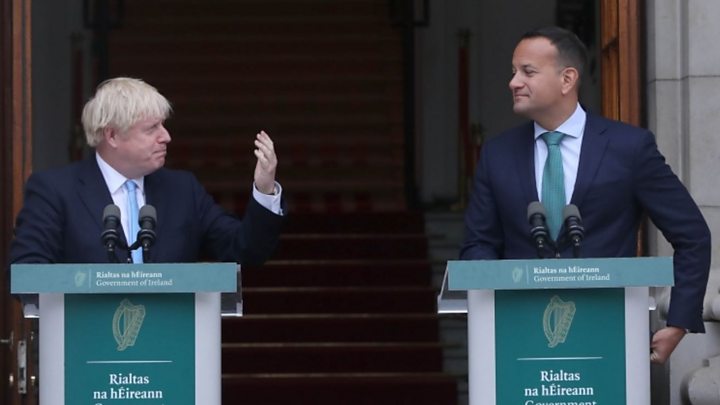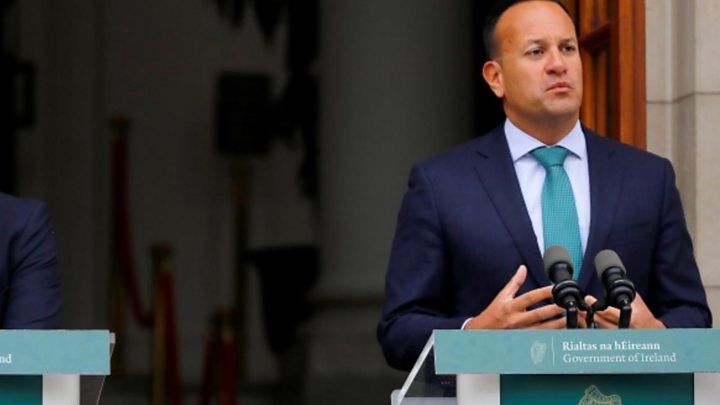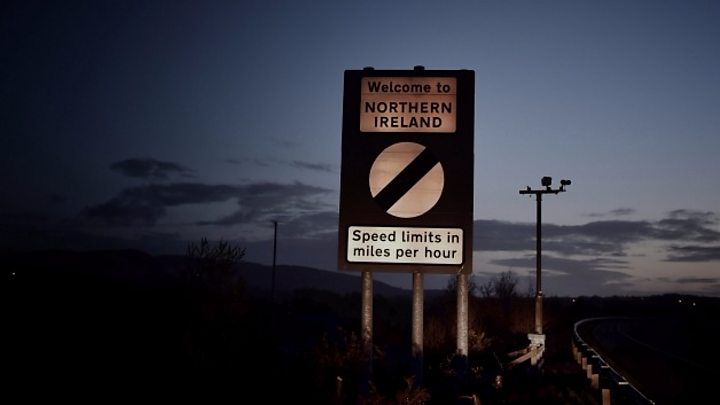
A no-deal Brexit would be a failure that both the British and Irish governments would be responsible for, Boris Johnson has said.
The prime minister is in Dublin for his first meeting with the taoiseach (Irish PM) since he entered Downing Street.
Downing Street confirmed Parliament would be suspended later after a vote on holding an early general election.
Opposition parties said they will not back the vote, meaning no election in mid October as Mr Johnson had hoped.
Speaking in Dublin, Mr Johnson said he believed a Brexit deal was still possible by the EU summit in October.
However Taoiseach Leo Varadkar said there was no such thing as a “clean break” between the UK and the EU.
- No-deal Brexit checks ‘needed near Irish border’
- Where might room for backstop compromise lie?
- MPs set to reject fresh call for early election
Mr Johnson has ruled out asking the EU to delay the Brexit deadline of 31 October – but the Irish government said it would support another extension.
Ahead of the meeting, Mr Varadkar said he would be asking Boris Johnson how he plans to get a Brexit deal through Parliament when he does not have a majority in the House of Commons.
But Mr Johnson told reporters in Dublin that he was “absolutely undaunted” about what might happen in Parliament in the coming days.
Downing Street later confirmed Parliament will be suspended when business in the Commons finishes on Monday night or the early hours of Tuesday.

He also said he had looked at the consequences of a no-deal Brexit, and “wanted to find a deal”.
“There are two tasks we simply have to do – we must restore Stormont and we must come out [of the EU] on 31 October, or else permanent damage will be done in the UK to trust in our democratic system,” he added.
Mr Varadkar said the Irish government “cannot and will not replace legal guarantee with a promise”.
Analysis: A change in tone?
By Jayne McCormack, BBC News NI Political Reporter
Boris Johnson arrived in Dublin trying to strike a more conciliatory tone than in previous weeks.
Perhaps brought to bear by cabinet ministers concerned about no deal, Mr Johnson insisted he wants an agreement.
But trust is a crucial tenet of any political relationship, something the Irish government is all too aware of.
A stony-faced Leo Varadkar said a deal is still possible, but warned that promises from the UK wouldn’t cut it.
The Irish government is also watching Westminster events closely, knowing that the prime minister is currently boxed in by the opposition parties and has few options left.
The breakthrough was never going to happen today, but what goes on behind closed doors in this key meeting could potentially pave the way for movement in the days to come.
Why is the meeting taking place?
The taoiseach invited Mr Johnson to Dublin two months ago, shortly after he was installed in Downing Street, to discuss Brexit.
The Irish government maintains that the backstop – the mechanism to avoid an Irish hard border – is needed in any withdrawal agreement, because of decisions made by the UK.
But Mr Johnson has said he will not sign up to a deal unless the backstop is removed, because it is “anti-democratic”.
Ahead of the visit to Dublin, the prime minister said he wanted to discuss the possibility of an all-Ireland food standards zone as part of a solution to replace the Brexit backstop.

There is also speculation that the government could propose returning to a backstop that would only apply to Northern Ireland, with the possibility of a role for the Stormont assembly before it could be triggered or new EU rules would take effect.
Meanwhile, Northern Ireland Secretary Julian Smith has denied claims that he would leave his position, following the resignation of Amber Rudd at the weekend.
Parliament suspension will go ahead
Downing Street confirmed on Monday that Parliament will be suspended when business in the Commons finishes later in the day.
This will happen after MPs have voted again on whether to hold an early general election.
Before Parliament is prorogued, MPs will debate progress reports updating them on efforts to restore the Stormont assembly, which collapsed more than two years ago.
Northern Ireland’s devolved parliament collapsed in January 2017 when Sinn Féin’s Martin McGuinness resigned as deputy first minister, citing the DUP’s conduct around a flawed green energy scheme as the main reason.
Talks aimed at restarting devolution have failed with one of the main sticking points being DUP opposition to an Irish Language act and the legalisation of same-sex marriage in Northern Ireland.
Mr Smith has said unless power-sharing talks succeed before Brexit happens, direct rule powers from Westminster will need to be implemented at pace.
Meanwhile, legislation designed to delay a no-deal Brexit and force the prime minister to request an extension to the deadline from the EU will receive royal assent later.
However, the prime minister has said he will not ask the EU for another extension, so it is unclear what might happen next.
The government will move another motion asking MPs to vote for a general election on Monday too, but it is unlikely to pass because opposition parties have agreed to reject the demand, saying Mr Johnson is trying to force through a no-deal exit.
What is the backstop?
The backstop is a key piece of the Brexit deal dictating what will happen to the border between Northern Ireland and the Republic of Ireland.
It is a last resort that guarantees a frictionless border if no better solution is devised in time – by maintaining close ties between the UK and the EU until such a solution is found.
The Irish government has insisted if it took effect it would only be temporary, but Boris Johnson has said he will not sign up to a deal unless the backstop is removed from the withdrawal agreement.
Johnson tells Varadkar no-deal Brexit ‘would be a failure’


